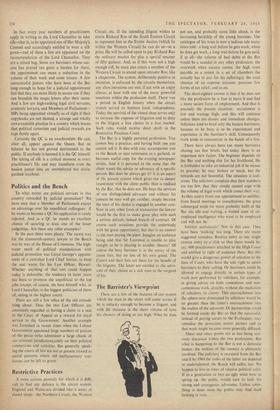Politics and the Bench
To what extent are political services in this country rewarded by judicial promotion? We have seen that a Member of Parliament enjoys an advantage over his unpolitical colleagues: if he wants to become a QC his application is rarely rejected. And as a QC he stands an excellent chance of securing at least one of the lesser judgeships. Are there any other examples?
In the past there were plenty. The surest way for the nineteenth-century lawyer to the Bench was by way of the House of Commons. The high- water mark of political manipulation with judicial promotion was Lloyd George's appoint- ment of a caretaker Lord Chief Justice, to keep the seat warm for his Law Officer, Hewart. Whether anything of that sort could happen today is debatable; the tendency in latter years has been to promote the unpolitical to the top jobs (except, of course, the boss himself who, as Lord Chancellor, is the biggest politician of them all, sitting in the highest court).
There arc still a few relics of the old attitude lying about. Thus the two Law Officers are commonly regarded as having a claim to a seat in the Court of Appeal as a reward for loyal service to the Government. Another example was furnished in recent times when the Labour Government appointed large numbers of justices of the peace (who administer a large chunk of our criminal jurisdiction)rsolely on their political connections and activities. But generally speak- ing the courts of law are not at present treated as useful pastures where old parliamentary war- horses can be left to graze.






































 Previous page
Previous page